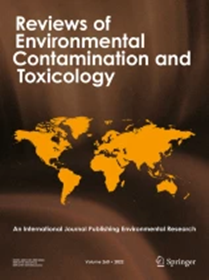环境中的微米和纳米塑料:近期的研究重点。
IF 6.6
3区 环境科学与生态学
Q1 ENVIRONMENTAL SCIENCES
Reviews of environmental contamination and toxicology
Pub Date : 2021-09-07
DOI:10.5281/ZENODO.4767185
引用次数: 16
摘要
分散在不同环境分区中的塑料垃圾是与人类活动相关的最令人担忧的问题之一。具体而言,微米和纳米尺度的塑料颗粒无处不在,对人类健康和环境构成威胁。在过去的几十年里,大量研究致力于评估微/纳米塑料污染的几个方面:来源和排放、不同隔间中的存在、环境命运、对人类健康和环境的影响、食物网中的转移以及相关化学物质和微生物的作用。尽管如此,尽管提供了大量信息,但仍存在一些知识空白。本文的目的是强调这些知识差距中最重要的一个,并为描述和理解最具争议的点所需的主要研究需求提供建议,以更好地指导近期的研究工作。需要进一步努力提高我们对微/纳米塑料暴露、影响和风险的认识的一些主要问题是:采样程序的统一;开发更准确、成本更低、耗时更少的分析方法;评估碎片的退化模式和环境命运;评估生物累积和转移到食物网的能力;以及评估与微/纳米塑料相关的化学品和微生物的命运和影响。我们所有知识领域的主要差距,从接触潜在有害影响,都涉及小尺寸微塑料,特别是纳米塑料的发生、命运和影响。本文章由计算机程序翻译,如有差异,请以英文原文为准。
Micro and Nano-Plastics in the Environment: Research Priorities for the Near Future.
Plastic litter dispersed in the different environmental compartments represents one of the most concerning problems associated with human activities. Specifically, plastic particles in the micro and nano size scale are ubiquitous and represent a threat to human health and the environment. In the last few decades, a huge amount of research has been devoted to evaluate several aspects of micro/nano-plastic contamination: origin and emissions, presence in different compartments, environmental fate, effects on human health and the environment, transfer in the food web and the role of associated chemicals and microorganisms. Nevertheless, despite the bulk of information produced, several knowledge gaps still exist. The objective of this paper is to highlight the most important of these knowledge gaps and to provide suggestions for the main research needs required to describe and understand the most controversial points to better orient the research efforts for the near future. Some of the major issues that need further efforts to improve our knowledge on the exposure, effects and risk of micro/nano-plastics are: harmonization of sampling procedures; development of more accurate, less expensive and less time-consuming analytical methods; assessment of degradation patterns and environmental fate of fragments; evaluating the capabilities for bioaccumulation and transfer to the food web; and evaluating the fate and the impact of chemicals and microorganisms associated with micro/nano-plastics. The major gaps in all sectors of our knowledge, from exposure to potentially harmful effects, refer to small size microplastics and, particularly, to the occurrence, fate and effects of nanoplastics.
求助全文
通过发布文献求助,成功后即可免费获取论文全文。
去求助
来源期刊
CiteScore
12.80
自引率
0.00%
发文量
11
审稿时长
>24 weeks
期刊介绍:
Reviews of Environmental Contamination and Toxicology publishes reviews pertaining to the sources, transport, fate and effects of contaminants in the environment. The journal provides a place for the publication of critical reviews of the current knowledge and understanding of environmental sciences in order to provide insight into contaminant pathways, fate and behavior in environmental compartments and the possible consequences of their presence, with multidisciplinary contributions from the fields of analytical chemistry, biochemistry, biology, ecology, molecular and cellular biology (in an environmental context), and human, wildlife and environmental toxicology.
•Standing on a 55+ year history of publishing environmental toxicology reviews
•Now publishing in journal format boasting rigorous review and expanded editorial board
•Publishing home for extensive environmental reviews dealing with sources, transport, fate and effect of contaminants
•Through Springer Compact agreements, authors from participating institutions can publish Open Choice at no cost to the authors

 求助内容:
求助内容: 应助结果提醒方式:
应助结果提醒方式:


